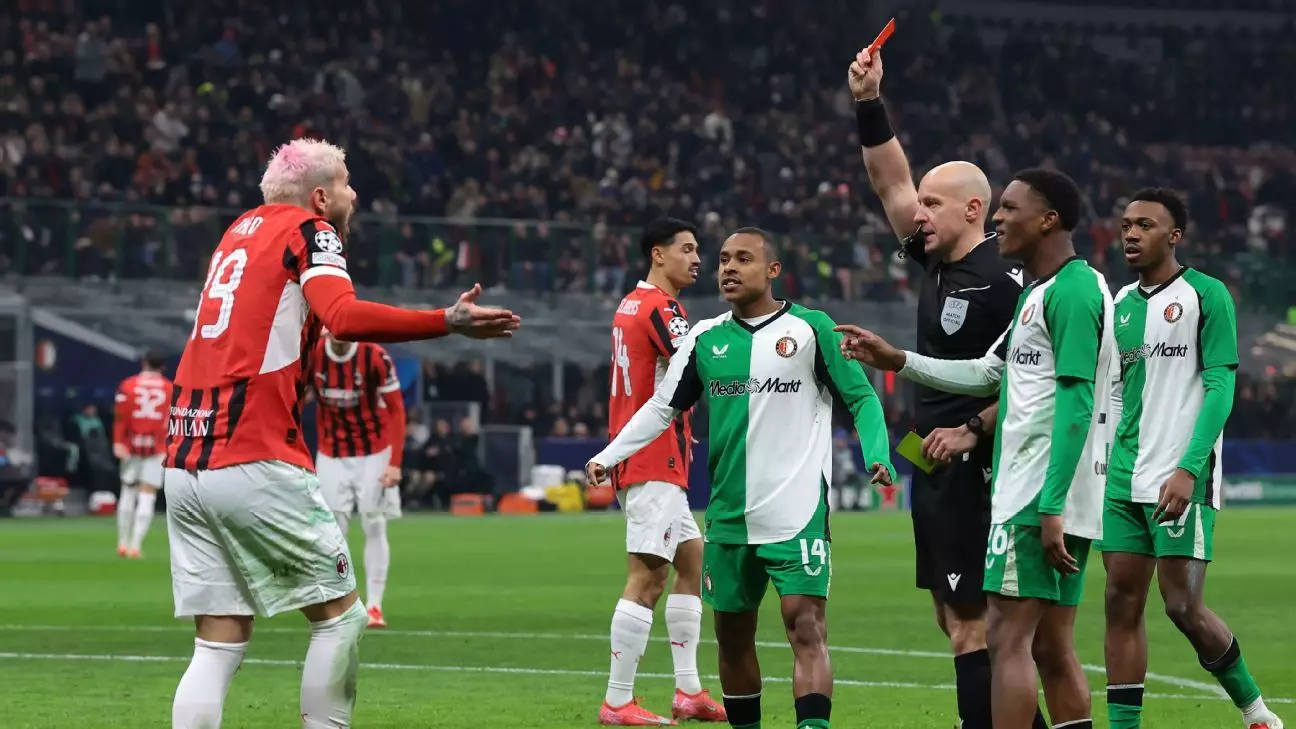In the crucible of European football, where the stakes rise higher with every passing moment, individual moments can define the fate of storied clubs. Such was the case recently for AC Milan during their Champions League playoff against Feyenoord, where a single poor decision by Theo Hernández turned a promising evening into a harrowing exit. Let us delve deeper into the implications of this match, examine the consequences of rash actions, and understand the nature of football pressure at its highest level.
The High Hopes of Milan
The setting was nothing short of cinematic: Milan, a club with a rich history in European competitions, found themselves at home, needing a two-goal victory to proceed after a lackluster performance in the first leg. Fans filled the San Siro, exuding an energy that reverberated through the players. An early goal from their new striker, Santi Gimenez, gave the home side a needed boost, and spirits were high. Given Feyenoord’s struggles—already reeling from significant player absences and managerial changes—the match seemed to present itself on a platter for their opponents.
Milan exhibited control for much of the first half, creating several opportunities that hinted at a potential second goal. As they entered the second half, even the most optimistic Feyenoord supporter would have felt a sinking feeling of dread. Milan seemed poised to claim their passage into the next round. However, football is notorious for its sudden shifts, and this encounter would be no exception.
A Critical Error
Five minutes into the second half, Hernández made a decision that would shift the tide away from his team. During a promising attack, he tumbled over the leg of a Feyenoord defender without any contact, leading to a yellow card that turned red mere moments later due to his prior booking. The dismissal was not just a numerical disadvantage; it was a psychological blow to a team that had been building momentum. With a player down, the structure of Milan’s gameplay faltered. Football, especially in high-stakes matches, is often a game of numbers and morale; an unexpected loss of a key player can unravel strategic plans and collective confidence in an instant.
The reaction from Marek’s teammates said it all. Even in the midst of this unfortunate turn, the players around him likely shared a collective disbelief. With just a glimmer of hope lost, Milan’s players were forced to adapt to a new reality—the game was now an uphill battle.
The Irrationality of It All
What could prompt a player lauded for his abilities to make such a glaring mistake? One explanation lies in the immense pressures faced at this level of the sport. In high-stakes matches, the balance between audacity and recklessness often hangs by a thread. Theo’s dramatic attempt to earn a penalty, while not uncommon, was painfully mistimed and poorly executed. There exists an unwritten rule among seasoned players: know when the gamble is worth the risk, and when to play conservatively.
Despite the bad timing, Milan’s management and senior players like Zlatan Ibrahimovic made it clear that the blame for the defeat extended beyond one man. Ibrahimovic’s words reflected a desire to bolster team morale in the wake of individual mistakes, emphasizing unity rather than scapegoating. Yet, the absence of accountability can sometimes lead to a cycle of repeating errors—a dangerous trap.
As the match progressed, Feyenoord seized the initiative, taking advantage of their numerical superiority. Tension escalated as frustration seeped into Milan’s play, further deteriorating their chances. Their attacking strategy faltered as the team struggled to adapt to playing with ten men, exposing not only poor game management but a lack of composure on the pitch. The frustrating performances of players like Rafael Leão and João Félix illuminated the impact of Hernández’s error on team dynamics. Their inability to maintain focus and discipline mirrored the growing chaos within the squad.
The compounding frustration culminated in another red card against Leão, exacerbating the situation and essentially sealing the fate of Milan’s Champions League aspirations. The night’s defeat echoed through the San Siro, but it conveyed more than just the end of a campaign; it illustrated the importance of thoughtful decision-making both on and off the pitch.
For AC Milan, the lessons learned from this catastrophic exit must shape their future endeavors. The pressure of high-stakes matches is unavoidable, but the key lies in behavioral consistency and emotional regulation under duress. While individual talent can take you far, it is the collective responsibility and discipline that will ultimately define a team’s success. Moving forward, Milan will need to address not only the technical aspects of their game but also the psychological fortitude required to thrive in European competitions. The future remains promising for the Rossoneri, but vital adjustments must be made to prevent history from repeating itself in future encounters on the grand stage.

